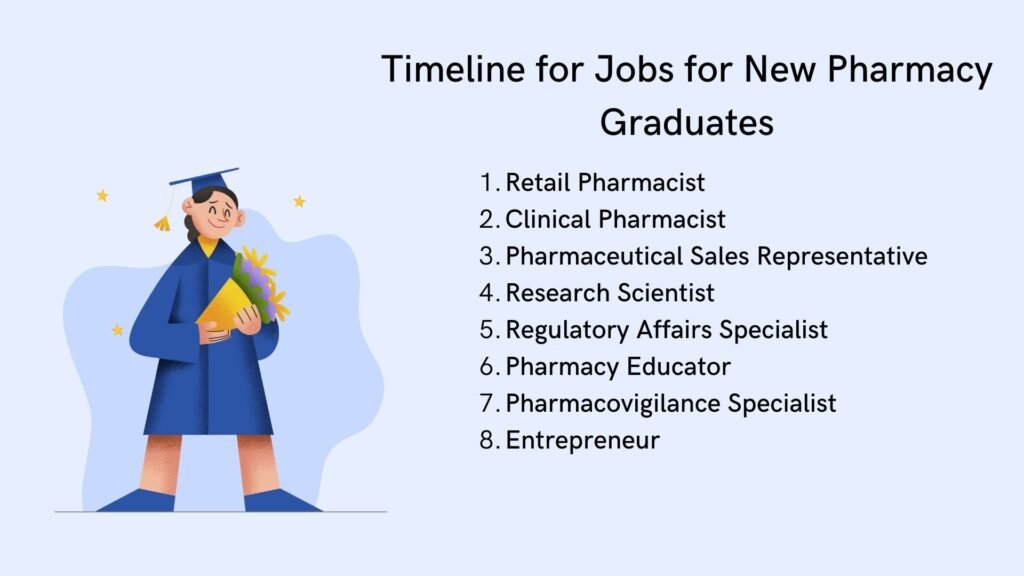Jobs for New Pharmacy Graduates:
Graduating with a pharmacy degree opens up a wide range of career opportunities in the healthcare and pharmaceutical industries. Whether you’re looking for clinical, retail, or research roles, there are numerous job options to start your career as a new pharmacy graduate.

1. Retail Pharmacist
Retail pharmacies are one of the most common workplaces for new pharmacy graduates. As a retail pharmacist, your responsibilities include:
- Dispensing medications.
- Advising patients on proper medication use.
- Managing inventory and pharmacy staff.
Key Employers: Chain pharmacies like CVS, Walgreens, or local community pharmacies.
2. Clinical Pharmacist
Clinical pharmacists work in hospitals and healthcare facilities to ensure patients receive optimal medication therapy. Their responsibilities include:
- Collaborating with doctors and nurses on treatment plans.
- Monitoring patient progress and medication effectiveness.
- Educating patients about their prescriptions.
Skills Needed: Strong knowledge of pharmacology and patient counseling skills.
3. Pharmaceutical Sales Representative
If you have strong communication and interpersonal skills, becoming a pharmaceutical sales representative is a great option. Your role involves:
- Promoting and selling pharmaceutical products to healthcare professionals.
- Explaining the benefits and features of medications.
- Building relationships with clients.
Benefits: High earning potential with commission-based incentives.
4. Research Scientist
For those interested in innovation and development, working as a research scientist can be fulfilling. Responsibilities include:
- Developing and testing new drugs.
- Conducting clinical trials.
- Analyzing data to ensure safety and efficacy.
Employers: Pharmaceutical companies, academic institutions, and research organizations.
5. Regulatory Affairs Specialist
A regulatory affairs specialist ensures that pharmaceutical products comply with laws and regulations. Job responsibilities include:
- Preparing and submitting documentation for drug approvals.
- Ensuring compliance with FDA or other regulatory bodies.
- Keeping updated on changes in pharmaceutical regulations.
Skills Needed: Attention to detail and strong knowledge of regulatory requirements.
6. Pharmacy Educator
If you’re passionate about teaching, you can become a pharmacy educator in universities or colleges. Responsibilities include:
- Teaching pharmacy students.
- Conducting academic research.
- Mentoring and guiding students in their careers.
Qualifications: A master’s or doctorate degree is often required for teaching roles.
7. Pharmacovigilance Specialist
Pharmacovigilance involves monitoring the safety of drugs and reporting adverse effects. Responsibilities include:
- Analyzing drug safety data.
- Reporting adverse drug reactions to regulatory bodies.
- Ensuring compliance with safety standards.
Employers: Pharmaceutical companies and regulatory agencies.
8. Entrepreneur
For those who dream of running their own business, opening a pharmacy or starting a pharmaceutical consultancy is a great option. Entrepreneurs need to:
- Understand local pharmacy regulations.
- Build strong relationships with suppliers.
- Offer excellent customer service.
References
To explore these opportunities further, check out the following resources:
- American Pharmacists Association (APhA)
- Pharmaceutical Research and Manufacturers of America (PhRMA)
- U.S. Bureau of Labor Statistics – Pharmacists
- Indeed Pharmacy Job Listings
A pharmacy degree opens doors to diverse and fulfilling career paths. Explore these roles and find the one that aligns with your skills and interests. Good luck on your journey as a new pharmacy graduate!
Discover More at Ask4 pharmacy
About Pharmacist About Pharmacy Free Courses Pharmacist in Usa Work As Phramacist